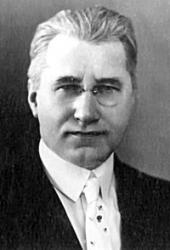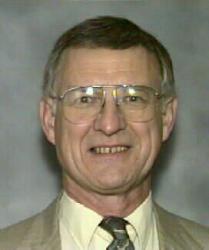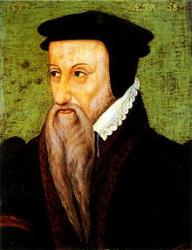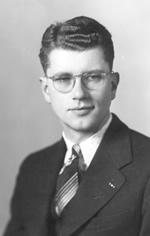Planning worship?
Check out our sister site, ZeteoSearch.org,
for 20+ additional resources related to your search.
- |
User Links
Person Results
Claude Goudimel

1514 - 1572 Person Name: Goudimel Composer of "[Mein Leben ist ein Pilgerstand]" in Evangelisches Gesangbuch mit vierstimmigen Melodien The music of Claude Goudimel (b. Besançon, France, c. 1505; d. Lyons, France, 1572) was first published in Paris, and by 1551 he was composing harmonizations for some Genevan psalm tunes-initially for use by both Roman Catholics and Protestants. He became a Calvinist in 1557 while living in the Huguenot community in Metz. When the complete Genevan Psalter with its unison melodies was published in 1562, Goudimel began to compose various polyphonic settings of all the Genevan tunes. He actually composed three complete harmonizations of the Genevan Psalter, usually with the tune in the tenor part: simple hymn-style settings (1564), slightly more complicated harmonizations (1565), and quite elaborate, motet-like settings (1565-1566). The various Goudimel settings became popular throughout Calvinist Europe, both for domestic singing and later for use as organ harmonizations in church. Goudimel was one of the victims of the St. Bartholomew's Day massacre of Huguenots, which occurred throughout France.
Bert Polman
Claude Goudimel
William Dalrymple Maclagan

1826 - 1910 Author of "The saints of God! their conflict past" in The Hymnal of the Protestant Episcopal Church in the United States of America 1940 Maclagan, William Dalrymple , D.D., son of David Maclagan, M.D., was born in Edinburgh, June 18, 1826. In early life he entered the army, and served for some time in India. Retiring with the rank of lieutenant, he entered St. Peter's College, Cambridge, where he graduated B.A. 1856 and M.A. in 1860. Taking Holy Orders, he was curate of St. Saviour's, Paddington, 1856-58, and St. Stephen's, Marylebone, 1858-60. He then became Secretary to the London Diocesan Church Building Society, from 1860 to 1865; curate of Enfield, 1865-69; Rector of Newington, 1869-75; and Vicar of Kensington, 1875-78. He was also Hon. Chaplain to the Queen, and Prebendary of Reculverland in St. Paul's Cathedral, London. In 1878 he was consecrated Bishop of Lichfield. Bishop Maclagan's work has been mainly of a practical character, and his publications are few. The few hymns which he has written have been received with great favour, and create a desire for more of the same kind and quality. The following are in common use.:—
1. Again the trumpet sounds. Missions. Written about 1870. Appeared in the Hymns Ancient & Modern Hymns Ancient & Modern series of Hymns for Mission Services. 1871.
2. Be still, my soul, for God is near. Holy Communion. Part ii. is “O Body, broken for my sake." Written about 1873 for St. Mary's, Newington. In Thring's Collection, 1882.
3. Holy Spirit, Lord of love. Confirmation. Written about 1873, and published in Mrs. C. Brock's Children's Hymn Book, 1884.
4. It is finished, blessed Jesus [Saviour]. Good Friday. Written for Hymns Ancient & Modern, 1875. In several collections.
5. Lord, when Thy Kingdom comes, remember me. Good Friday. Written for the 1875 ed. of Hymns Ancient & Modern. Sometimes given in two parts: Pt. ii. Beginning, “Lord, when with dying lips my prayer is said."
6. The Saints of God their conflict past. All Saints. First published in Church Bells, 1870; and again in the Society for Promoting Christian Knowledge Church Hymns, 1871.
7. What thanks and praise to Thee we owe. St. Luke. Written for the 1875 edition of Hymns Ancient & Modern
These hymns are of more than usual merit, being characterized by great simplicity, tenderness, and fervour. The special season or purpose is clearly indicated, and its lessons earnestly enforced.
-- John Julian, Dictionary of Hymnology (1907)
=============
Maclagan, Abp. W. D., pp. 709, i.; 1578, ii. At the present time all Abp. Maclagan's hymns are in common use, and most of his tunes likewise. With regard to the latter, it is exceptional to find so many tunes by the author of popular hymns sharing the same popularity in the principal hymnals. In Church Hymnal, 1903, and Hymns Ancient & Modern, 1904, combined, there are eight of his tunes, whilst the hymns are six in all.
--John Julian, Dictionary of Hymnology, New Supplement (1907)
William Dalrymple Maclagan
William Kuipers

1883 - 1933 Person Name: William Kuipers, 1884-1933 Author of "O God of Hosts" in Hymns for Youth Born: 1883, Rochester, New York.
Died: 1933, Passaic, New Jersey.
Buried: Restlawn Cemetery, Grand Rapids, Michigan.
Kuipers emigrated from Friesland to America, in the late 1880s, graduated from Calvin College, Grand Rapids, Michigan, and was ordained in the Christian Reformed Church. He served at the Second Christian Reformed Church of Fremont, Michigan (1914-19); Christian Reformed churches in Oakland, Michigan (1919-23); Dennis Avenue, Grand Rapids, Michigan (1923-27); and Summer Street, Passaic, New Jersey (1927-33). He wrote a number of poems, hymns, and psalm versifications.
© The Cyber Hymnal™ (hymntime.com/tch)
William Kuipers
Friedrich Adolph Lampe
1683 - 1729 Person Name: Friedrich Adolf Lampe, 1683-1729 Author of "Mein Leben ist ein Pilgrimstand" in Glaubenslieder Lampe, Friedrich Adolf, D.D., son of Heinrich Lampe, pastor of the Reformed church at Detmold, was born at Detmold, apparently Feb. 18, and was certainly baptized there Feb. 19, 1683. He remained at Detmold till the death of his grandfather (General-Superintendent Zeller) in 1691, and then joined his widowed moiher at Bremen. He entered the Lyceum (Academic Gymnasium) at Bremen, in 1698; and in 1702 went to the University of Franeker in Holland. After a short residence at the University of Utrecht he became, in 1703, pastor of the Reformed church at Weeze, near Cleve; in 1706 at Duisburg; and in 1709 second pastor of St. Stephen's Church in Bremen, where in 1719 he became pastor primarius. In 1720 he was appointed German preacher and professor of dogmatics at the University of Utrecht (the degree of D.D. being also conferred on him); and in 1726 professor of Church History and Rector of the University. After a severe illness in the winter of 1726-27 he resigned in June, 1727, and returned to Bremen as third pastor of St. Ansgar's Church and professor at the Lyceum. He died at Bremen, Dec. 8, 1729. (Allg. Deutsche Biog., xvii. 579; F. A. Lampe Sein Leben und seine Theologie. By Dr. Otto Thelemann, 1868, &c).
Lampe was the most important theologian that had appeared in the German Reformed Church since the Reformation period. He was the great exponent of the Federal or Covenant theology in his Geheimniss des Gnadenbundes, 1712 if.; the author of a well-known commentary on St. John's Gospel, 1724-26; of various catechetical works, &c. As a hymn-writer Lampe is not so important; but yet ranks as one of the best writers in the Reformed Church. His hymns are Scriptural, and characterised by glowing piety, deep spiritual insight, firm faith, and play of fancy; but are often somewhat obscure and involved, and not seldom very lengthy. Nine first appeared in his Balsam aus Gilead, Bremen, 1713, and the rest principally in his Bündlein XXV. Gottseliger Gesange, Bremen, 1723 [Royal Library, Berlin], and later editions. The edition of 1731 (XXX. Geistliche Lieder, &c.) contains also an appendix of 13 hymns from his manuscript.
Comparatively few of Lampe's hymns are in modern German common use. Those which have passed into English are:—
i. Mein Leben ist ein Pilgrimstand. For Travellers. 1723, No. 10, p. 39, in 8 St., entitled "Travelling Thoughts." In the Berlin Geistliche Liedersegen, edition 1863. Translated as, "My life is but a pilgrim-stand," by Dr. H. Mills, 1845 (1856, p. 150).
ii. 0 Fels des Heils am Kreuzesstamm. Holy Communion. 1723, No. 5, p. 21, in 12 stanzas of 5 lines entitled "Devotional Hymn at Holy Communion." In Dr. J. P. Lange's Kirchenliederbuch, 1843, st. xii. is omitted, and it begins "O Fels des Heils, O Gotteslamm." The translation in common use is:—
O healing Rock, O Lamb of God. A translation of stanzas i.-iii., v., xii., by Dr. R. Maguire, in his Melodies of the Fatherland, 1883, p. 107. Repeated, omitting stanza iii., in R. Gault's Hymn Book for Church of England, 1886.
iii. 0 Liebesgluth, wie toll ich dich. Love to Christ. Founded on St. John iii. 16. 1723, No. 19, p. 50, in 6 stanzas. Previously in his Geheimniss des Gnadenbundes, pt. iv., vol. ii., 2nd ed., Bremen, 1721, p. 1086. In Bunsen's Versuch, 1833, omitting stanzas ii., iv. Translated as: (1) "O Fire of Love, what earthly words," by Mrs. Bevan, 1858, p. 61. (2) "O wondrous love of Christ! how bright," by Dr. G. Walker, 1860, p. 75.
iv. So ist von meiner kurzen Pilgrimschaft. New Year. 1723, No. 24, p. 69, in 16 stanzas. The form translation is that in the Berlin Gesang-Buch, 1829, No. 424, altered, and beginning "Wie schnell verstrich, O Herr voll Mild und Huld." Translated as, "How swift, O Lord, most kind, most bountiful," by J. L. Frothingham, 1870, p. 255. [Rev. James Mearns, M.A.]
--John Julian, Dictionary of Hymnology (1907)
Friedrich Adolph Lampe
Howard Slenk

b. 1931 Harmonizer of "GENEVAN 84" in Psalter Hymnal (Gray) Howard J. Slenk (b. Holland, MI, 1931) received his undergraduate education from Calvin College and his Ph.D. from Ohio State University in Columbus; his dissertation was entitled The Huguenot Psalter in the Low Countries. He taught at Trinity Christian College in Palos Heights, Illinois, and at Calvin College from 1967 until retiring in 1995. From 1970 to 1993 Slenk served as organist and director of music at Woodlawn Christian Reformed Church in Grand Rapids. His published works include A Well-Appointed Church Music (1960) and various articles on Genevan psalmody.
Bert Polman
Howard Slenk
Théodore de Bèze

1519 - 1605 Person Name: Th. de Bèze Author of "O God of Love (Ó seregeknek Istene)" in Little Psalterium Bèze, Théodore de, born at Vezelay, in Burgundy, 1519; died 1605. Bèze’s father was of noble birth. He occupied the post of bailiff at Vezelay. Bèza received a first-rate classical education under Melchior Wolmar. Before he was 20 he wrote some poetry in imitation of Catullus and Ovid, the licentiousness of which he mourned and condemned in alter years. A brilliant prospect of Church emoluments turned his attention from the distasteful study of law. The income of the Priory of Longjumeau made him rich, and he became a prominent member of the literary world at Paris. But his entrance into Orders was barred by a secret marriage with Claudine Denosse. Subsequently, when the offer of the abbey of Froidmont by his uncle made it necessary for him to decide between avowing his marriage and renouncing the prospect, or repudiating his wife, he decided, under the solemn conversion produced by a dangerous illness, to abandon the Roman Church, and break with his whole past life. He left for Geneva (1548), and there publicly married. His first scheme for a living was to join his old comrade Jean Crespin, then at Geneva, in printing; but his appointment to the Professorship of Greek at Lausanne (1549), left the printing office in the hands of Crespin. Before his departure fiom Geneva ho had been on intimate terms with Calvin; and the discovery of a metrical rendering of Ps. 16 on Beza's table at Geneva led Calvin to suggest to him the completion of Marot's Psalms. At Lausanne he became a friend of Viret. He stayed there ten years, during which he wrote a tragi-comedy, and 40 of his metrical Psalms (36 published in 1551, 6 more in 1554). He had whilst at Lausanne a narrow escape from death by the plague. In 1557 he went with Karel and Budams to ask for the intercession of the German Protestant Princes in behalf of the persecuted Hugue-nots, and had interviews with Melanchthon. In 1559 he was appointed pastor at Geneva, Assistant Professor of Theology to Calvin, and the first Rector of the newly founded College of Geneva. With Peter Martyr and others he represented the Huguenots in the conference with the Queen-Mother and Cardinal Lorraine, at Poissy (1561), and remained at Paris nearly two years afterwards. His French metrical Psalter, in continuation of Marot, was completed in 1562. Calvin's death, 1564, left Beza the foremost figure at Geneva. In 1571, at the summons of the King of Navarre, he presided at the Synod of the Reformed Churches at Rochelle; and again (1572) at Nismes. His wife died in 1588, and he married again soon afterwards. His public life, as a theologian, a preacher, and administrator, ceased about 1598, though he preached again for the last time in 1600. He was honoured till his death; only three years before which the Landgrave of Hesse visited him, when passing through Geneva. The works of Beza are very numerous. As a controversialist, a commentator, an investigator of the text of the New Testament, he occupied a high place in his time. Among his chief works are: Annotationes in N. T.., 1556; Novum Testamentum, 1556; Psalms, with paraphrase in Latin, 1579; Life of Calvin, 1563. [Rev. H. Leigh Bennett, M.A.]
-- John Julian, Dictionary of Hymnology (1907)
Théodore de Bèze
Henry A. Bruinsma

1916 - 1991 Harmonizer of "TABERNACLES" in Psalter Hymnal (Blue) It was in Bruinsma's musical compositions that his brilliance was most displayed. “Henry’s personality was … embodied in his music: colorful, radiating charisma, magnetic in a nonverbal way,” niece Jane DeGroot said.
Bruinsma displayed musical potential even before he was considered old enough to take music lessons, said his wife, Grace Hekman Bruinsma. The preschooler would eavesdrop on his older brother’s piano lessons. After the teacher left, Bruinsma would climb onto the piano bench to practice his brother’s lesson assignment. Later on, he chose to attend Ottawa Hills High School in Grand Rapids, Mich., for its music program.
Following high school graduation in 1933, Bruinsma attended the University of Michigan for a degree in music. He stayed on to complete a Ph.D. in musicology, becoming the first musicologist to graduate from the University of Michigan. It was during his graduate work that Bruinsma wrote Scherzo on a Dutch Nursery Song. “He never lost his love for Dutch history or Dutch Reformed music,” Grace Bruinsma said.
It was also during his time at U of M that Bruinsma began taking Grace to music concerts, and in 1939 they were married.
Bruinsma began his time as a professor of music at Calvin College (1946-55). In addition to his teaching duties at the college, Bruinsma taught the first music and theology course at Calvin Seminary. He also chaired the first Conference on Liturgy of Music.
However, not long after his time at Calvin, Bruinsma decided he was being called to move from teaching to education administration. Of note is his time at Ohio State University (1959-64), where he served as the director of the School of Music. He also held the position of executive committee member of the College of Education.
Next, Bruinsma moved to what is now Arizona State University (1964-79), another notable mark in his education administration career. During that time, he served first as chair of the School of Music, then as founding dean of the College of Fine Arts. He is also known to have started the first religious studies program at Arizona State as part of the university’s interdisciplinary studies program.
Due to the amount of time he spent in education administration, much of Bruinsma’s musical compositions were never published. After his death, Grace Bruinsma contacted Gerry Bouma of Morningside College in Sioux City, Iowa. Bouma and Henry Bruinsma had met in 1969 at a Grand Rapids Christian High School concert in Chicago. “For whatever reason, Henry and Grace treated us like we were their kids,” Bouma said. Grace asked Bouma to catalog and publish the 10,000 pages of Henry’s material. Taking a semester sabbatical, Bouma began his work.
Bouma’s catalog of Bruinsma’s work can be found in the Heritage Hall Archives at the Hekman Library, Calvin College. The Archives also hosts additional works from Bruinsma’s time at Calvin.
--Excerpted from Calvin Spark, Spring 2006 issue
Henry A. Bruinsma
Ada Roeper-Boulogne
b. 1931 Versifier of "How Lovely Is Your House, O LORD" in Psalter Hymnal (Gray) Ada Roeper-Boulogne (b. Haarlem, the Netherlands, 1931) received her elementary education at the Dutch-Chinese Christian School in Central Java, Indonesia (then the Dutch East Indies), where her father, an organist and rebuilder of organs, served as a missionary and teacher. After Japan conquered Indonesia during World War II (1942), Roeper-Boulogne's family was placed in a concentration camp and remained there until 1945. Because a teacher organized a children's choir in the camp, even there Roeper-Boulogne was not totally devoid of music. In 1946 the family returned to the Netherlands and in 1951 immigrated to St. Catharines, Ontario, Canada. Roeper-Boulogne has translated several Dutch songs and is the author of "Little Children Be Happy," which was published in Bible Steps (1983).
Bert Polman
Ada Roeper-Boulogne


 My Starred Hymns
My Starred Hymns


